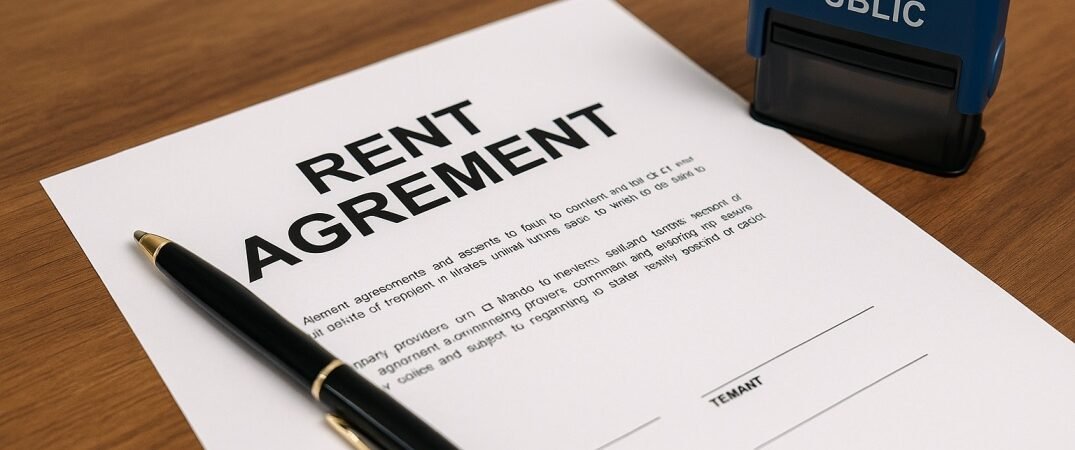Whether you’re a landlord renting out your property or a tenant moving into a new place, having a properly drafted rent agreement is crucial.
But the big question is — is notarization enough, or should you go for registration?
Let’s break it all down in simple terms while keeping the legal angle strong and accurate.
📝 What Is a Rent Agreement?
A rent agreement is a legally binding document between a landlord and a tenant.
It outlines the terms and conditions of the rental arrangement.
These typically include:
- Rent amount
- Duration of stay
- Security deposit
- Maintenance responsibility
- Notice period
- Terms for termination
The agreement is governed by the Indian Contract Act, 1872 and in many states also by local rental control laws.
📋 What Should Be Included in a Rent Agreement?
Make sure the following key points are included:
- Full names and addresses of landlord and tenant
- Description of the rented property (address, area, type)
- Monthly rent and due date
- Security deposit amount
- Lease term (start and end date)
- Notice period for termination
- Maintenance charges and responsibilities
- Restrictions (e.g. subletting, pets, etc.)
- Penalty for late rent payment
- Utilities and bills
Tip: Always add a clause about renewal or escalation in rent if the lease continues beyond a year.
🧾 Is Notarization Enough?
This is one of the most common questions.
✅ Notarized Rent Agreement:
- This is used for short-term agreements, usually less than 11 months.
- It’s not legally mandatory but acts as a supporting document in case of disputes.
- It is not admissible as primary evidence in court but can be used to support your claims.
❌ Limitations:
- If the agreement is over 11 months, it must be registered under the Registration Act, 1908.
- Notarized agreements are not recognized by some government offices and banks for address proof.
🏛️ Registered Rent Agreement: When Is It Mandatory?
If your rental agreement is for:
- 12 months or more
- Long-term lease with a fixed term
- High-value rent properties
Then, it must be registered with the local Sub-Registrar Office as per Section 17 of the Registration Act, 1908.
Stamp duty and registration charges apply depending on your state.
📌 Why Should You Register the Rent Agreement?
Here’s why it’s worth it:
- It becomes legally enforceable in a court of law.
- Offers greater protection for both landlord and tenant.
- Helps in police verification and address proof.
- Banks and financial institutions ask for it for loan applications, KYC, etc.
💰 What Are the Stamp Duty and Registration Charges?
These charges vary by state.
Here’s a rough idea:
| State | Stamp Duty | Registration Fee |
| Maharashtra | 0.25% of annual rent + deposit | ₹1,000 (if done online) |
| Karnataka | ₹200 (fixed for notarized) | 1% of rent + deposit (if registered) |
| Delhi | 2% of annual rent + deposit | ₹1,100 approx |
| Tamil Nadu | 1% of annual rent + deposit | ₹2,000 max |
Note: Always check the latest fee structure in your local Sub-Registrar Office or official website.
🧑💼 Who Drafts a Rent Agreement?
You can get your rent agreement:
- Drafted by a lawyer
- Created online through legal service platforms
- Some brokers and property managers offer standard formats
But if you want a customized, legally sound agreement, it’s best to consult a property lawyer.
🖋️ Steps to Create a Rent Agreement
Here’s the step-by-step process:
- Draft the agreement with mutual consent
- Print it on stamp paper of appropriate value (based on your state)
- Get it signed by both parties and two witnesses
- Notarize it (if short-term), or
- Register it at the Sub-Registrar’s Office (if more than 11 months)
📑 Documents Required
You’ll need:
- Identity proof (Aadhar, PAN, Passport, etc.) of landlord and tenant
- Proof of ownership (property tax receipt, electricity bill, etc.)
- Passport-size photographs
- Stamp paper of proper value
- Two witnesses with ID proofs
🤔 So, Notarization vs. Registration — Which Should You Choose?
| Criteria | Notarization | Registration |
| Validity Duration | Up to 11 months | 12 months or more |
| Legal Standing | Not strong in court | Fully admissible in court |
| Use for Govt./Bank Purpose | Limited | Widely accepted |
| Mandatory? | No | Yes, if over 11 months |
📣 Final Thoughts
If your rent duration is less than 11 months, notarization is generally sufficient.
But if it’s for 12 months or more, you must go for registration to stay legally compliant.
Also, if your rent agreement is linked to other legal processes like loan applications, tax deductions, or dispute resolution, registered agreements provide stronger protection.
📞 Need Help Drafting or Registering a Rent Agreement?
We’re here to help.
Our legal team can assist with custom rent agreements, notarization, and registration anywhere in India.
📧 Email us at: [ranjinijayaram@rjpropertylaw.com]
📱 Call/WhatsApp: +91 80884 17193
🌐 Visit: www.rjpropertylaw.com

